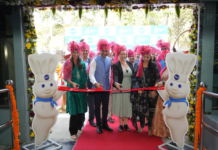
Saudi Arabia based Sabic announced that Orkla, a diversified Nordic brand owner in business-to-consumer (B2C) commerce with foods, snacks, food care for sport, and food ingredients, has launched its first chips packaging using certified renewable polypropylene (PP) polymer from Sabic’s Trucircle portfolio. The sustainable material is derived from tall oil, a residual product from the Nordic forestry industry. It is converted into a Biaxially Oriented PolyPropylene (BOPP) by Irplast, a major Italian vertically integrated manufacturer of specialty S-BOPP films and converter of printed shrinkable BOPP roll-fed labels and PSA tapes. In Orkla’s chips bags, the material solution helps lower the carbon footprint of the three partners’ value chain in half compared to the use of traditional non-renewable plastics.
“We want to make it easier for consumers to make environmentally conscious choices,” says Sara Malmström, sustainability manager at Orkla Confectionery and Snacks. “Packaging is an important part of all our products, and plastic packaging in particular can have a considerable impact on both the environment and climate. We are proud to be first in the Swedish market to put chips in bags made with plastics based on bio-renewable feedstock on the snack shelf,” she adds.
According to Sabic, Orkla had been looking for an innovative and agile converter capable of meeting its sustainability targets and supplying a renewable film that would enhance their packaging’s sustainability profile. They identified Irplast, with whom Sabic had already been successfully collaborating in various projects to develop film products in compliance with EU Packaging and Waste Packaging Directives. Next to Natural Oriented PolyPropylene (NOPP) films from certified renewable PP polymer, Irplast also offers an S-BOPP (Simultaneously oriented BOPP) film range branded as LOOPP that uses certified circular Sabic PP material with feedstock from chemically recycled post-consumer plastics to deliver virgin-quality resins. Irplast’s NOPP and LOOPP products have received independent third-party International Sustainability and Carbon Certification (ISCC PLUS).
Naomi Lunadei, sustainability manager at Irplast, explained, “We firmly believe that sustainable growth must become a priority for businesses producing and converting plastic packaging materials. As a packaging producer, we are well aware of our responsibilities in making the 2030 Sustainable Development Goals a reality, and we are very committed to the challenge. Our two new BOPP lines demonstrate the determined route we have embarked on with Sabic. While our NOPP products help reduce the carbon footprint of flexible packaging, the innovative LOOPP range opens a door for customers to enter the circular plastics economy which is being progressively mandated by legislators worldwide.”
In contrast to comparable BOPP film from traditional fossil fuel, every kilogram of renewable NOPP packaging takes more than 2 kg of CO2 emissions out of the environment. The first set of new Orkla packages in NOPP flexible film includes 275-gram bags of Grill, Sour Cream and Onion, Dill and Chive and Salted Chips, and prominently displays the 50% CO2 reduction to consumers. Orkla Confectionery and Snacks Sweden have the ambition to introduce similar bags for all their snacks packages gradually.
“We are proud of successfully implementing our certified renewable PP polymer in Irplast’s flexible packaging for Orkla,” said Mark Vester, Circular Economy leader at Sabic. “The ISCC Plus accredited materials from our Trucircle portfolio offer drop-in solutions for replacing fossil-based plastics in the packaging industry with no compromise on food safety. With our certified circular and renewable polymers, we are aiming to create a sustainable value chain where we collaborate with downstream customers like Irplast and Orkla in the use of animal-free bio-based feedstock or in the reuse of post-consumer recycle, thereby seeking to capture the greatest value from sources that have traditionally been ignored or discarded.”
Sabic’s Trucircle offering spans from design for recyclability services and mechanically recycled materials to certified circular products from chemical recycling of used plastics and certified renewable polymers from bio-based feedstock. Sabic’s certified polymers are based on a mass balance approach. This widely recognized international sustainability certification scheme verifies that the mass balance accounting follows predefined and transparent rules. In addition, it offers traceability along the supply chain, from the feedstock to the final product.
IndiFoodBev — authentic, impactful and influential
An English-language food and beverage processing and packaging industry B2B platform in print and web, IndiFoodBev is in its third year of publication. It is said that the Indian food and beverage industries represent approximately US$ 900 billion in revenues which implies more than 20% of the country’s GDP. Eliminating the wastage on the farmside can help to deliver more protein to a higher number of the population apart from generating sizable exports. The savings in soil, seeds, water, fertilizer, energy and ultimately food and nutrition could be the most immense contribution that country is poised to make to the moderation of climate change.
To improve your marketing and grow sales to the food and beverage processing and packaging industry, talk to us. Our research and consulting company IppStar [www.ippstar.org] can assess your potential and addressable markets in light of the competition. We can discuss marketing, communication, and sales strategies for market entry and growth.
Suppliers and service providers with a strategy and budget for targeted marketing can discuss using our hybrid print, web, video, and social media channels to create brand recognition linked to market relevance. Our technical writers are ready to meet you and your customers for content.
The second largest producer of fruit and vegetables in the world is continuously expanding processing capacities and delivery systems with appropriate innovative technologies. We cover product and consumer trends, nutrition, processing, research, equipment and packaging from farm to thali. Get our 2025 media kit and recalibrate your role in this dynamic market. Enhance your visibility and relevance to existing markets and turn potential customers into conversations. Ask for a sample copy of our bi-monthly in print or our weekly IndiFoodBev eZine each Wednesday.
For editorial info@ippgroup.in — for advertisement ads1@ippgroup.in and for subscriptions subscription@ippgroup.in
Naresh Khanna – 10 February 2025
Subscribe Now










